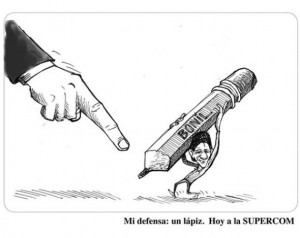Ecuadorian communications agency Cordicom has put to rest a complaint made to governmental censorship agency Supercom earlier this year, determining that a recent cartoon by Javier Bonilla (aka Bonil) is in fact not promoting a discriminatory message against the LGBTQ community.
In light of the news, several LGBTQ activists are using the resolution as an opportunity to strengthen their relationship with the media in an attempt to prevent baseless and harmful accusations such as the one against Bonil from occurring again. The activists assert that the baseless accusations only further hurt LGBTQ groups’ efforts to eliminate discrimination and could result in self-censorship in the media over fears of facing charges from Supercom.
The cartoon that incited tensions between portions of Ecuador’s LGBTQ community and the press originally ran in the newspaper El Universo on December 28, 2015. It depicts two women, one of whom is pregnant, having a conversation about the unborn child’s gender. When asked whether she’s having a boy or girl, the pregnant woman replies “I don’t know. We’ll see what the baby chooses for its ID,” which is likely a reference to a recent legislative change to government IDs that opponents argue allows people to “choose” their gender.
A coalition of LGBTQ groups filed a complaint with Supercom alleging that the cartoon violates Article 62 of Ecuador’s communication law, which prohibits “discriminatory content that has the purpose or effect of undermining or nullifying the recognition, enjoyment or exercise of human rights recognized in the Constitution and by international entities.” This isn’t Bonil’s first run-in with Supercom. In 2015, Bonil was charged with socioeconomic discrimination for a cartoon mocking legislative assemblyman, Agustin “Tin” Delgado, and Supercom ordered a public apology for the cartoon and fined Bonil $500,000 for the infraction.
In response to this most recent complaint, governmental agency Cordicom (Council for the Regulation and Development of Information and Communication) issued a statement on February 19, declaring that the cartoon does not contain discriminatory content and openly acknowledging public fears that the actions taken by Supercom might have been an attempt to silence the press.
Newspaper La Hora reported on Cordicom’s decision, quoting council member Paulina Mogrovejo’s comment that the decision does not mean “that we agree with the treatment of communications content that in some way can distort a message, or affect the historic fight of the LGBTQ community.” Rather, it was made to “dismantle the myths” of persecution made against the media.
Echoing these sentiments, several LGBTQ groups and human rights activists have spoken out against denouncing the press, noting the necessity to work collaboratively with journalists and to keep the press free. Launching the social media campaign #MiVozConElPeriodismo (My Voice with Journalism), groups like the Ecuadorian Observatory for Collective and Minority Human Rights and It Gets Better Ecuador are hoping to dispel fears that lead to censorship in the media. They aim instead to strengthen relationships with the media.
“Media serve, like the campaign says, to amplify our voice,” said Diana Maldonado, who works with the Ecuadorian Observatory for Collective and Minority Human Rights. “Our causes, our fights, would not have had the outcomes and the repercussions they had, if it had not been for the intervention of the media.” Other groups have posted messages online, pointing out that “Homophobic bullying kills and the only way to combat it is through information. Journalists are our allies.”
Although things looked grim a month ago for cartoonist Bonil, portions of the LGBTQ community have used the complaint to Supercom to propagate a new positive message of the necessity of free press in Ecuador. As one LGBTQ activist posted online, “Good journalism destroys prejudices, reveals our humanity and connects us all.”
Help support CBLDF’s important First Amendment work by visiting the Rewards Zone, making a donation, or becoming a member of CBLDF!
Contributing Editor Caitlin McCabe is an independent comics scholar who loves a good pre-code horror comic and the opportunity to spread her knowledge of the industry to those looking for a great story!
